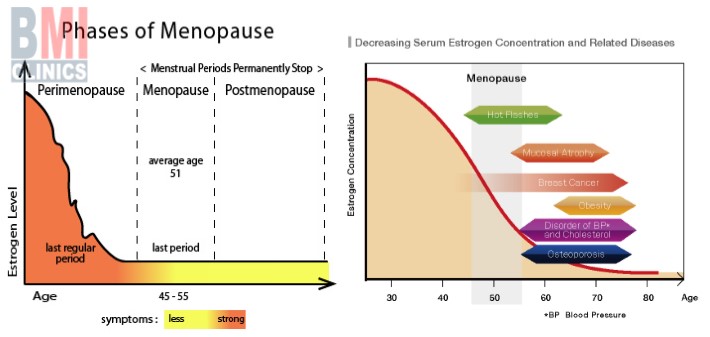The most relevant signs of menopause can be defined as the absence of menses for twelve consecutive months. It is typically the time at which a woman stops having menstrual periods. Menopause is considered a normal part of aging when it happens after the age of 40. However, some women can go through menopause early due to the damage of the ovaries, such as from chemotherapy, or because of surgeries, such as hysterectomy. Not only does menopause represent the end of a woman’s reproductive cycle, but also it is associated with a variety of other changes.
Women do experience menopause in several different ways. Some women sail through menopause over a long period while others describe a much briefer and more subdued menopausal experience. Regardless of personal differences, there are certain signs of menopause that tend to be quite common for women. It is important to be aware of changes related to menopause since it can sometimes be mistaken for other physical conditions.
How Does Menopause Happen?
Natural menopause is not brought on by any kind of surgical or medical treatment. The process is steady and has 3 stages:
1- Perimenopause
This condition begins several years before menopause, when the women’s ovaries slowly make less estrogen. The condition lasts up until menopause, a time at which the ovaries stop releasing eggs. During the last two years of perimenopause, the drop in estrogen accelerates. At this point, several women have menopause signs.
2- Menopause
This is the stage at which it has been twelve months since a woman had her last menstrual cycle. At this point, the ovaries have stopped releasing eggs and making estrogen.
3- Postmenopause
These are the years after menopause. During this time, menopause signs such as hot flashes ease for most women. However, health issues related to the loss of estrogen increase as the woman ages.
Signs of Menopause
Hot Flashes
Hot flashes occur because of the hormonal changes that women’s body undergoes during menopause. Hot flashes are one of the most common symptoms of menopause and it can occur at any time of the day or night and can last from 30 seconds to a few minutes. Signs are sudden feeling of extreme heat in the entire body, sweating, followed by flushing in the neck; chest and face in light skinned women, and sometimes anxieties. When hot flashes occur at night, they are known as night sweats and can cause sleep disorders due to interrupted sleep. Hot flashes usually last two to three years, but many women can experience them for up to five years or longer. Between all the signs of menopause, this is the most annoying one.
Vaginal Changes
Since estrogen affects the vaginal lining, women undergoing menopause may also have pain during sexual intercourse and may note a change in vaginal discharge.
Loss of Libido
Vaginal dryness can contribute to loss of libido during menopause as pain and discomfort during intercourse can significantly reduce your desire for sexual activity; although the major cause is hormone imbalance. Your situations can become worse if you have a partner with a higher libido than you, and a loss in desire for intercourse can usually result in body image and self-esteem issues and concerns about getting older.
Mood Changes
The changing hormones in women’s body can cause an attack of emotional highs and lows that might remind them of the ones they experienced if they were ever pregnant. These mood changes can include low sex drive, depression, anxiety, irritability and mood swings. One may also experience memory loss or trouble concentrating.
Bone Loss
Swift bone loss is common during the perimenopausal years. Most women reach their peak bone density between age 25 and 30. After that, bone loss averages 0.13 percent per year. During menopause, bone loss accelerates to around 3 percent per year. Later, bone loss drops off to around 2 percent per year. Luckily, there is no pain that is associated with bone loss. However, bone loss can cause osteoporosis (osteoporosis is a condition that increases the risk of bone fractures). These fractures can be very painful and can increase your risk of death.
Itchy Skin
Although this sign of menopause is not widely known, many women complain of itchy skin during the transition to menopause. This condition can be disruptive and very uncomfortable, especially if it disturbs your sleep. The symptom can manifest itself as a feeling of numbness or “pins and needles” and in some cases a sensation like ants or insects crawling up your skin.









